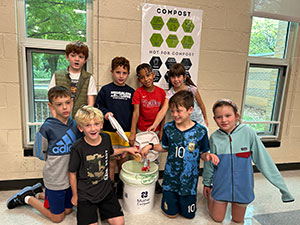Beaumont Elementary School Launches Composting Program
October 2024

Beaumont Elementary in Easttown Township launched a cafeteria composting program at the beginning of this school year as a pilot that has proved highly successful after only four weeks.
The program was initiated by Cara Rash, parent of a 2nd and 5th grader, who also volunteers on Easttown Township's Environmental Advisory Council. In 2019, Rash noticed the school had a garden that was not being tended. After learning that soils and compost are part of the 2nd grade curriculum, she volunteered to bring it back to life, and now the garden is completely managed by the 2nd grade class. Since getting it up and running in 2021 the garden has produced over 800 lbs. of vegetables for the Chester County Food Bank. The garden needs compost to keep the soil healthy, and the school had a 2-barrel composter that filled up quickly and didn't have the right mix of "ingredients" to produce quality compost, so the school began looking at other options for composting.
Cara and her family use a composting service for food scraps generated in their home, so she reached out to their composting company, Mother Compost, who also collects food scraps from other local schools in addition to residences. With support and data from Mother Compost, Rash pitched a cafeteria composting program to the school's Home and School Association (HSA) and school principal. With the approval of the HSA, Rash applied for a Zero Waste grant from the Chester County Solid Waste Authority and was awarded $3,927 which will fund two years of food scraps pick-ups by Mother Compost.
Patti Lynn, Chester County's Recycling Resources Manager who runs the Solid Waste Authority's Zero Waste grant program remarked, "This is the first Zero Waste grant presented to a school for food waste composting. Having engagement of the Beaumont School staff, parent association, and young students is integral to the program's success, and not an easy task. But education and waste reduction together can change behaviors."
Four weeks in the program is already a success: the school generates 300-350 lbs. of compostable material each week and has reduced the amount of cafeteria waste by about half. Because the school switched from plastic to compostable lunch trays, they added an additional compost bin just to collect the trays. Non-compostable materials entering the bins was an issue at first, though with student education and vigilant lunch monitors, contamination has been significantly reduced.
"Elementary aged children can do this. They are excited by it," commented Rash. She noted that many children have told their parents about the program who then signed up for home composting service. Since starting the program, the middle school and the Tredyffrin-Easttown school district have already expressed interest in learning how Beaumont's composting program is going. Rash hopes that because of the significant amount of waste being diverted away from the school's dumpsters, the school will be able to negotiate a reduced rate for trash hauling and be able to pay for continued composting service through these cost savings.

